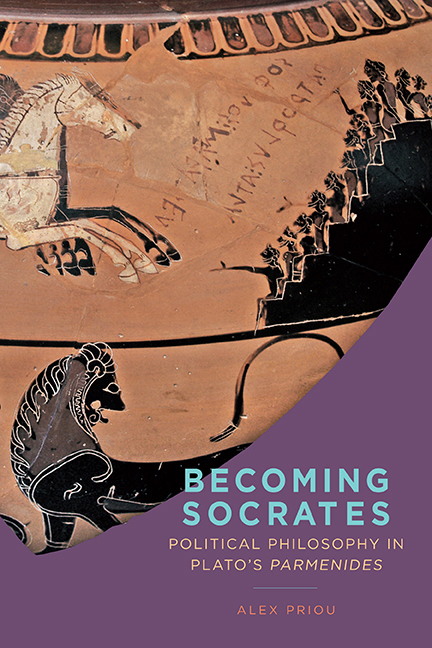2 - Parmenides on Socrates’ “Platonism”: Parmenides 126a1–137c4
Published online by Cambridge University Press: 15 April 2021
Summary
Prologue (126a1–127d5)
While the Parmenides is a complex dialogue, its complexity isn't restricted to its maze of ontological arguments. The cast of characters, setting, and transmission are equally complex, and it seems needlessly so. To begin with, the dialogue's cast is quite large: there are roughly seven people in the prologue and internal conversation each. In the prologue we meet Cephalus, Adeimantus, Glaucon, Antiphon, a nameless bronzesmith, and Cephalus's fellow citizens, who number at least two but are perhaps more. Likewise, in the internal conversation we meet Socrates, Zeno, Parmenides, Pythodorus, Aristoteles, and those who came with Socrates, said to be many (127c2: ἄƛƛους τινὰς μϵτ᾽ αὐτοῦ ποƛƛούς), but because the entire group consists of seven (129d1: ἑπτὰ ἡμῶν ὄντων), really no more than two. The complexity keeps growing once we start sorting the characters out. To begin with names, four—Cephalus, Adeimantus, Glaucon, and Socrates— are familiar from the Republic, although the Cephalus of the Parmenides is not the Cephalus we find in the Republic. Like Cephalus, Antiphon's name is shared with another, his grandfather, while Aristoteles’ name recalls Plato's famous student. Eponymy aside, there are also the nameless, who seem unimportant enough to warrant anonymity: Cephalus's fellow citizens, those with Socrates, and the smith. Yet also unnamed is the all-important man Cephalus points to obliquely, when he asks Adeimantus and Glaucon the name of their brother of the same mother, i.e., their half brother Antiphon, and hence not their brother of the same father, i.e., Plato, our author. Looking to origins, things grow still more complex. Politically, Socrates, Pythodorus, Aristoteles, Adeimantus, Glaucon, and Antiphon are all of Athenian origin, with whom we could reasonably presume the smith and those with Socrates belong, though we cannot be sure. The rest are not Athenians: Parmenides and Zeno come from Elea, while Cephalus and his fellow citizens are from Clazomenae. Regarding parentage, we’ve already seen that Adeimantus, Glaucon, Plato, and Antiphon all have the same mother, while Antiphon has a different father.
- Type
- Chapter
- Information
- Becoming SocratesPolitical Philosophy in Plato's 'Parmenides', pp. 17 - 73Publisher: Boydell & BrewerPrint publication year: 2018



